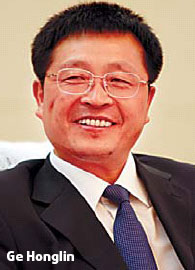

|
Tianfu Square of Chengdu |
Ge Honglin, mayor of Chengdu, capital of Southwest China's Sichuan province, describes his city as a mix of Frankfurt of Germany, Paris of France, and Chicago in the United States. On his business card, above a picture of a group of pandas sitting on bamboo leaves, a line reads: "A city you never say goodbye to."
Chengdu is traditionally known as the "land of abundance". It is famous for pandas, romantic poets, spicy hotpot and, more recently, bars and a relaxed atmosphere.
But the mayor prefers to describe Chengdu as a vital economic hub, an inland city with great potential for economic growth as China promotes development of western areas.
Ge, a former vice-president of Baosteel Group, one of China's largest State-owned enterprises, says his last job trained him to think like an entrepreneur. In fact, the Shanghai native has on many occasions acted as Chengdu's main PR man.
He's jumped on opportunities to promote the city to foreign investors, attending the American Chamber of Commerce in China's annual dinner last year, the only mayor to attend. At the 30th Anniversary of Canada China Business Council, he gave a lecture during the lunch and held several meetings with Canadian businesspeople.
Ge is confident that as the world gets increasingly flat, economically speaking, inland Chinese cities such as Chengdu will play an increasingly important role in China's economic development. For the past several decades, coastal cities have flourished thanks to convenient transportation. Now, as hi-tech and industry play a more important role, inland cities are in a good position to develop.
Ge is trying to prepare Chengdu for the change.
The city's greatest advantage, he says, is human resources. While factories in many coastal cities suffer a shortage of skilled workers, Ge says that Chengdu has made vocational education one of the top priorities of the city's policy making.
"I am really concerned about training 'grey collar' and 'blue collar' workers," he says. In addition to stipends from the central government, the local government offers extra subsidies to workers and their children living in the Chengdu suburbs so they can receive technical training. The subsidy will cover all school costs, and in some cases, even family living expenses.
The local government encourages high school students to attend vocational schools if they fail to enter college. In December, the city spent 350 million yuan to build a vocational school. The school, which will begin recruiting students in September, plans to send over 10,000 technicians per year to Chengdu and beyond.
Chengdu aims to become a base for the information technology, automotive and food processing industries. A vast number of skilled workers will be needed to fill the gap. According to its initial plan, the school will offer training courses and cooperate with enterprises to supply talent to enterprises.
Apart from the talent pool, Chengdu is trying to build itself into a place that is suitable to live. Ge is proud that nearly all foreign embassies have located their offices in western China to Chengdu. "They chose it because they feel comfortable living here," he explains, adding that Chengdu aims to be one of the cleanest cities in China.

The initiative for a clean city may trace the city's earlier effort to appeal to foreign investors. A story posted on the city government website tells that when Intel searched for a site for its chip plant in 2003, they used to ask: "If Intel set up a factory here, where will the birds that used to live here go?"
According to Ge, almost all the buses and taxies in the city burn gas instead of oil as a way to reduce polluting emissions. By 2009, the city expects to safely burn all the rubbish, instead of using landfills. It has also moved the major factories out of the city, and is generating electricity with water, instead of burning coal.
In 2007, the city government spent over 5 billion yuan and built over 30 sewage water processing facilities. Efforts to improve air quality have also paid off: 311 days last year had good air quality. The Egret, a rare bird that has long been unseen in the city due to heavy pollution, has recently returned, according to a CCTV report.
"We want to be the city with the best environment in China, and I think we are well on the road," Ge says.
The city's GDP is expected to reach 332 billion in 2007, up 15.8 percent year-on-year. The income per capita is expected to reach $4,000. Ge aims to increase the disposable income of urban citizens by 8 percent, and rural residents by 10 percent.
Ge says a strong foundation has already been laid, and that Chengdu's future looks bright.
"When you have the human resources and a suitable place for people to live, enterprises will come and see whether there is a market here for themselves," Ge says.
(China Daily 01/21/2008 page10)













